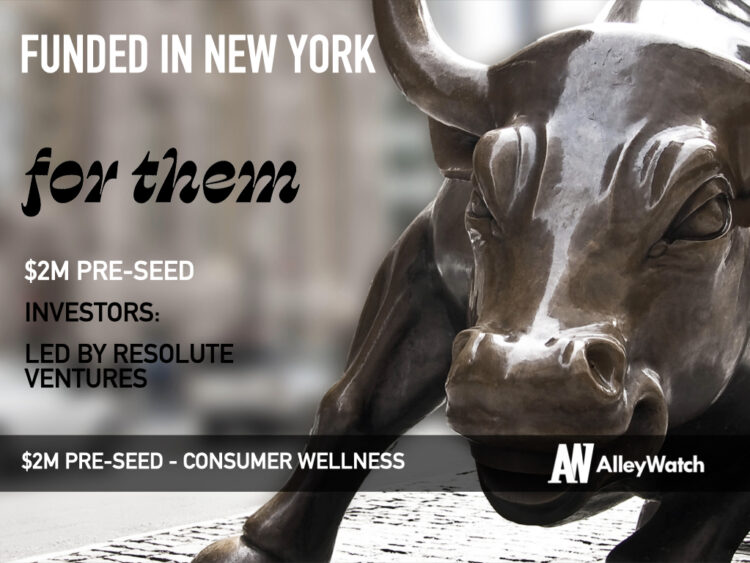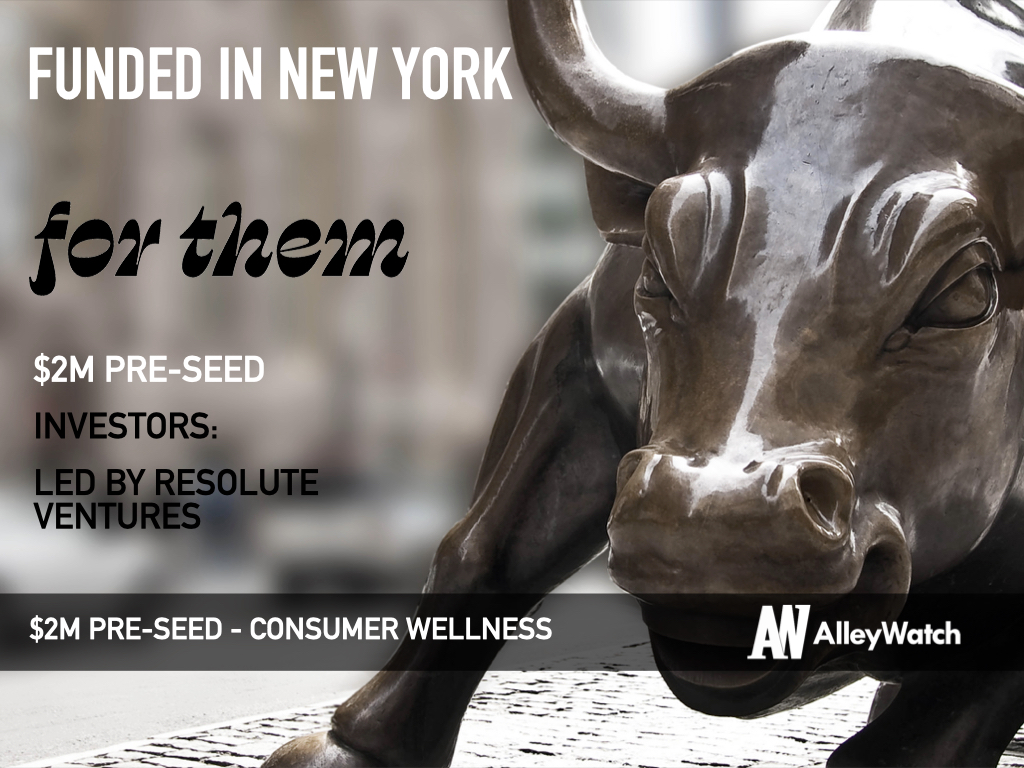Non-discriminatory services and products are on the rise to specifically address the health challenges, wellness, and needs of the LGBTQ+ community. For example, binding is a technique that’s used to reduce the appearance of a person’s chest to relieve gender dysphoria. For Them is a wellness brand that builds products to cater to the needs of the queer and gender diverse market. The company currently offers two products – its own binder, which is like a compression garment with comfort, and a CBD-infused serum. Driven by community, For Them leverages its growing Discord channel for product development ideas based on feedback and even co-creates products with members of the community.
AlleyWatch caught up with For Them CEO Chloe Freeman to learn more about the gap in the market that the company addresses, the inspiration for the business, the company’s strategic plans, recent round of funding, and much, much more.
Who were your investors and how much did you raise?
For Them was incubated out of Prehype. Resolute Ventures led our $2M pre-seed round with participating investors including Yes VC, Animo Ventures, Gaingels Spark Fund, and a range of personal investors including Toyin Ajayi, Lindsay Ullman, Ashley Mayer, Jackie Rice, Caroline Whitton, Bracken Darrell, Mike Smith, Josh Abramson, Leif Abraham, and Ruzwana Bashir.
Tell us about the product or service that For Them offers.
For Them builds products and services that our community asks for. Our first two products are The Binder—a comfortable binder that binds wearers to their maximum healthy bind without sacrificing comfort, breathability, or style; and The Fluid Serum—a CBD-infused intimacy serum.
What inspired the start of For Them?
I couldn’t find underwear that made me look and feel good. My trans and nonbinary friends would bind, but every time I wore a binder, I just couldn’t breathe. So, my options were to a) wear a binder and not be able to breathe or move freely; b) have top surgery—which wasn’t an option for me—or c) not wear anything at all, and not feel affirmed in my gender. There were no good options.
We started by focusing on tackling this singular problem, but quickly realized from speaking with our community that the lack of wellness resources for queer and gender diverse folx was a huge and pervasive issue. With For Them, we set out to create holistic care that stems from the idea that queerness and gender diversity exist and as unique individuals, queer people have unique needs.
Three things set us apart.
First, we are community-driven. A lot of brands say this, but few actually trust customers enough to let them really steer product development. We only develop what customers ask for—we do not manufacture “need”—and we stay in close communication within our Discord community.
Second, we intentionally define wellness very broadly, with nine dimensions that are particularly meaningful to the LGBTQ community. These include Embody, Nourish, Transcend, Dwell, Bloom, Connect, Share, and Belong.
Lastly, as a company of artists, we really believe in the transformative power of art to feed wellness. We hope that no matter your gender or sexuality, you can experience a kind of everyday magic through our brand, our products, and artists we showcase.
What market does For Them target and how big is it?
For Them’s mission is to serve the unique wellness needs of the queer community. Wellness is a $4.2 trillion industry serving everything from physical health, to self-care, to mental wellbeing and more. While 33% of Gen Z in the US identify as queer or gender diverse, there are only a handful of companies serving the unique wellness needs of the community.
What’s your business model?
Our model is community-driven product development. We co-create products directly with our customers to ensure we’re not manufacturing problems to solve but serving the direct needs of our customers.
What are your post-COVID office plans?
We plan to combine an office with a warehouse where we package each of our products, with love, in-house!
What was the funding process like?
We knew going in it might be challenging. We wanted to make sure that we had folx on our cap table that understood our mission and fully supported For Them’s vision to build for the community. We decided to send a video of our customers to potential investors before speaking to anyone. It ended up being a really powerful tool, to see the folx we are serving talk about the pain points that they had and how For Them could really impact their lives. It really helped investors understand our mission and why it is important.
We knew going in it might be challenging. We wanted to make sure that we had folx on our cap table that understood our mission and fully supported For Them’s vision to build for the community. We decided to send a video of our customers to potential investors before speaking to anyone. It ended up being a really powerful tool, to see the folx we are serving talk about the pain points that they had and how For Them could really impact their lives. It really helped investors understand our mission and why it is important.
What are the biggest challenges that you faced while raising capital?
Just like the wellness industry underserves the queer community, so does the VC industry. It’s no secret that there is an immense lack of female and POC VC investors, but I was shocked at just how hard it was to create a fully diverse cap table.
Ultimately, I was surprised by the range of investors who were moved by For Them, regardless of their race and gender identity.
We’ve built our team with a focus on partnering with those strongly aligned with this vision. I’m super excited by the group of investors and advisors joining us, who each understand the vitality of this mission and what it will take to bring it to life.
What factors about your business led your investors to write the check?
I think uniqueness in terms of our customer base and strategy. There are not a lot of companies focussing on this demographic, especially from a wellness perspective. Our community-focused product development is a key differentiator for strategy.
As the founder, I am also the customer. I care deeply about the queer community and our mission – I think that is very important to investors.
I think uniqueness in terms of our customer base and strategy. There are not a lot of companies focussing on this demographic, especially from a wellness perspective. Our community-focused product development is a key differentiator for strategy.
As the founder, I am also the customer. I care deeply about the queer community and our mission – I think that is very important to investors.
What are the milestones you plan to achieve in the next six months?
In the next six months, our goal is to continue growing our community and creating products queer folx need—our community on Discord is constantly providing ideas for new products that aren’t currently represented in the market for queer folx.
We’re also building our team, with the mission of creating an equally diverse team as the community we serve.
What advice can you offer companies in New York that do not have a fresh injection of capital in the bank?
My advice would be to re-focus on the customer. Talk to them and make sure you really understand their problems, pain points, and needs, without the bias of the steps you’ve already taken. I believe that is the key to a successful business, with or without capital. And if raising capital is your goal, I think it will certainly help!
Where do you see the company going now over the near term?
We just launched our first two products this month. The binder had a waitlist of over 800 people and is hand-sewn by our amazing manufacturing team in New York. With the current worldwide supply chain issues, we’re lucky to have so much of our product in the US but are dealing with many of the same delays as major retailers. Our current focus is getting as many products to as many people as possible.
What’s your favorite outdoor dining restaurant in NYC?
Via Carota! It’s awesome.






